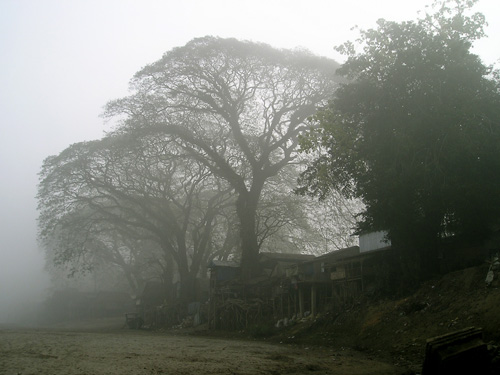Ships in the Mist: Scenes from a Burmese Childhood
by Khet Mar / August 4, 2010 / No comments
Translated by Thar Tet Toe
This month we have dedicated our coverage to Burma and it’s repressive and secretive regime. Because publishing is so tightly controlled there and the government regulates communication, it is difficult to have access to stories of daily life in Burma, a perspective offered here by City of Asylum writer-in-residence Khet Mar. Khet Mar fled Burma in 2006 after her relief work with Cyclone Nargis survivors attracted the attention of the junta.
You can learn more about Khet Mar’s journey in her posts and in an upcoming interview with Sampsonia Way managing editor Silvia Duarte.
Khet Mar will also be reading her work on September 11, 7:30 at the 2010 Jazz Poetry Concert along with American poet Yusef Komunyakaa, former COA/P writer in residence Horacio Castellanos Moya, New Zealand native Hinemoana Baker, and Belarusian writer Maryia Martysevich. Jazz musician Oliver Lake will accompany them. The concert will take place on Sampsonia Way, near the Mattress Factory.
After I finished primary school, I had to go to high school in Lay-ain-su, a larger village larger some four miles away from my home. I got there by catching a two-story steamer at Ma-U-Bin, a town in the delta close to our village. To be able to catch the ship, I had wake up at four in the morning. Grandma got up too. I helped her cook for my tiffin box. There were days that the ship never showed up. Or I was late. On those days, I had to walk to school.
I almost always walked home; I could seldom catch the steamer that came back from the city. Children, me included, left the village for school in the wee hours of the morning came back home late in the evening when it was pitch dark. At home, we’d take a bath, have dinner, do some homework, prepare a meal for the next day, and go to bed as early as we could manage, in order to get up early the next day to catch the steamer.
The steamer usually came late on misty winter mornings because the mist reduced visibility and made it too dangerous. Thus, steamers usually stayed docked till the sun came up. No matter whether the steamer would be late or not, we, the school children, still had to get up early to be at the jetty on time. Nobody could tell when or if the steamer would appear.
No one except Grandma. It must have been her accumulated knowledge, she could make a perfect guess. As Grandma opened up the windows of the house in the morning, she looked up at the sky and would say, “The steamer will come late today.” But she never added: “Go slow, girl.”
There was no electricity in our small village. Thus, no lamp posts on the lanes. I will never forget the mornings I set out to the jetty, clutching the freshly-cooked, still-hot tiffin box in my chest while the chill in the air made me shiver. I was then in the fifth grade, just ten or eleven years old. It was fifteen to twenty minute walk from home to the jetty. Neither Grandma nor Mother herself could afford to offer me their company on the way. I might find some schoolmates halfway, or some people going to town. Having someone alongside made me feel better than being alone, but that didn’t happen everyday.
Each time I set out for the jetty, I habitually spoke certain verses of Buddha, like Sambuddhae Mantra or the verse on His nine virtues. On days when the sky was filled with mist I hummed a song by a famous country singer of Burma. The center of the song is snow (which is not actually “snow” but “mist” in the warm land of ours). I know the lyrics of the song, Saung ye Hnin ye Ko Chit-thu ye (which means “Winter, Snow and My Beloved”), but just a portion of it. And yet I was still too young to know the meaning the song conveys.
Early the next year, a middle-school was opened in our little village, and this freed me from the lonely walks in the misty mornings to get to school in time. Even though, when I saw mist as I looked out the window on some mornings, I burst out: “Snow…snow.” My mood lightened. I rushed outside, gathered fallen leaves on the ground and set a fire. Neighbor children, seeing this, gathered to seek some warmth and some fun. We circled up, linking hands and moved round and round, playing the game of Wine-gyee Pat-pat Du-wai-wai, or sat down and listened as each of us took turns to telling whatever story he or she knew. It was so much fun that I tried to gather all the fallen leaves piled up on the winter ground. Our little backyard was soon clear and tidy, more so than other seasons.
When it was winter, specifically, the month of December, I could hear footsteps in the early morning while I was still in bed. It was the sound of people—young and old alike—who sought the winter’s opportunity to do some walking as a physical exercise. I was tempted to join them although I was reluctant to get up in the chill of early morning. When I told Mother and Grandma that I would like to go out for a walk like the others, they did not readily agree. In general, it is not considered good for young girls—innocent and immature—to mix with boys and men when they are all by themselves. There were boys in the morning crowd and Mother and Grandma seemed to worry that I would get caught by the charms of one of the boys. In fact, I have to confess that my inner desire to join the winter crowd was somewhat playful. Noticing some dashing young men, naturally, a girl’s heart tended to throb.
There was a boy at school who took a fancy to me. He was a grade below me, but seemed senior in age. Though I was never inclined to go steady with him, he could make my heart skip an occasional beat. He was tall, dark, and handsome with thick eyebrows and long curled-up lashes, which was quite unusual for a boy. His looks moved me noticeably, I must confess. Yet, I still held the notion that it was not the time for flirting. And I still did not really know what love really was.
He was a simple-minded boy with respectable manners. Though he was simple, he knew his way to my heart. One time at school, he intentionally let me overhear that he walked every morning. He also gave me three or four love letters. Yet he still mispronounced my name! An element in my name is Moet, which is an adjective meaning plump and round like a baby’s cheeks. But he took Moet for Moe. Moe means sky (short for moe-kaung-kin), rain (moe-yay), or rainy season (short for moe-yar-thi.)
“Of all the seasons, I love Moe (Moe-yar-thi) best,” he said to his friend so I could overhear during a morning walk. I uttered a sound of amusement when I heard him mispronouncing my name.
“When you walk, swing your arms.” he declared to his friend so I could overhear. “That is better exercise.”
That was the way we spoke to me, always sending words via somebody else around him. I felt somewhat warm with emotions, while the winter wee hours gave me the shudders. However, the excitement didn’t take long to disappear because it was not love. Maybe it was just fascination or a momentary whim. The next day, I spent the pleasant winter’s morning in bed. While he walked, I curled up leisurely till the sun came up. I don’t even remember when the magnetic eyes with luring lashes vanished from my daydreams.
After graduating from high school, I entered the University of Rangoon. I found myself again making the long walks in the foggy mornings to the same old two-storey ship, but this time I took it the other way; home to Grandma, and Mother.
As I began writing and publishing late in my University days, I noticed these misty winter mornings held a marked significance in my memory. When I write a story, I unconsciously name the center character “Snow. We, the Burmese, living in a scorching land, frequently use the naming element “snow” to signify innocent beauty in a girl. For us, the naming word “snow” brings us something calm and cool, and of delightfully beautiful nature in a person. It was something vague and cool, something that cannot be touched, but felt physically or emotionally.
On the contrary, the “snow” I perceive right here in America is different from the so-called “snow” back in my homeland. The “snow” here is much colder, and comes in masses of flakes accumulating in thick layers and big heaps. It is not the pleasant bracing fog of my homeland, so I stay at home. It seems best to watch the snowy landscape out of the window. Day in, day out, I become tired of it.
One day last winter, I spent the day in bed, reading a hoard of Burmese monthlies. As it got late in the afternoon, I went down to kitchen Wow! I uttered: “The Sun!”
I rushed to the window. Instantly, the dreariness I had been suffering vanished. I burst out giggling. Now I could share the feelings the American singer had when he sang, “You are the sunshine of my life!”
I have been crazy about “snow” in my younger days. From now on, I suppose I should dwell more on sunshine than snow. Thank goodness it’s summer.






